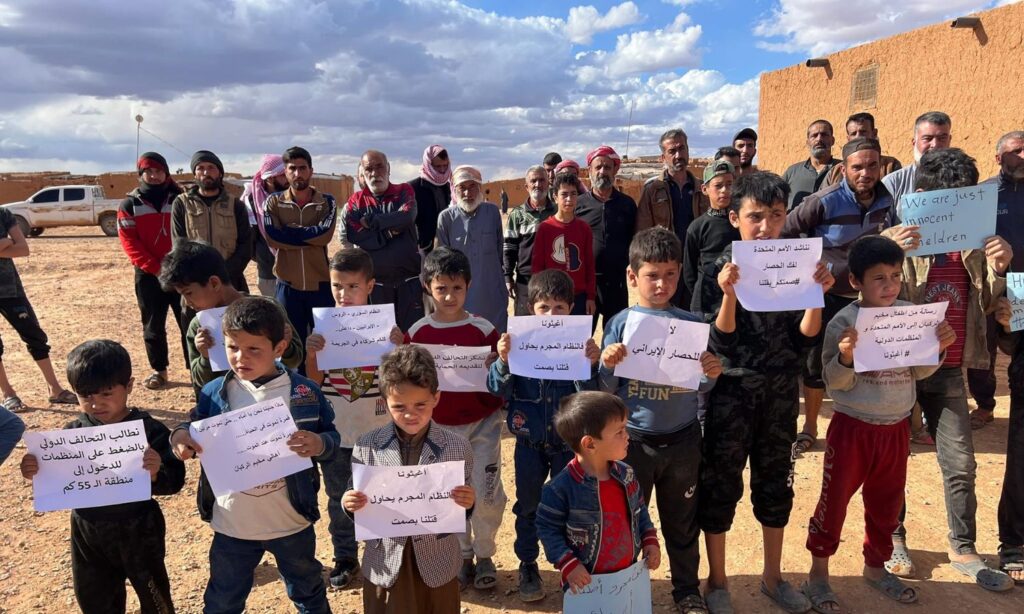Mohammed al-Khalidi’s three-year-old daughter does not stop crying after the supply of baby formula ceased in the Rukban camp on the Syrian-Jordanian border due to a siege imposed by Syrian regime forces for nearly three months, preventing the entry of medicines and food.
Al-Khalidi held the position of head of the local council in the camp until recently, demanding basic necessities for the residents, but he stands powerless, like all residents, in providing food for his infant daughter, as healthy alternatives or solutions are unavailable.
The camp’s siege coincides with Jordan’s continued closure of the medical point in 2020 due to the COVID-19 pandemic, and Jordan’s official stance that issues related to the camp are “an internal Syrian matter.”
Rukban, located in the 55-kilometer zone managed by the US-led International Coalition, continues to suffer from deteriorating living conditions for years, with only minimal interventions from Syrian and international organizations, while the International Coalition distances itself from the plight of the 8,000 residents there.
Al-Khalidi told Enab Baladi that recently, baby formula was scarce in the camp’s market, causing the price of a can to rise to 150,000 Syrian pounds (about ten dollars).
Enab Baladi contacted a pediatrician residing in Daraa province, southern Syria, due to the lack of specialized doctors in Rukban. The doctor explained the dangers of cow and goat milk due to the child’s inability to tolerate its concentration, which can lead to enteritis from contaminated animal milk.
The doctor, who requested anonymity for security reasons, added that thoroughly heating animal milk is essential before offering it to children, who might still not tolerate it even after heating, especially if they are under six months old.
According to the doctor, one of the risks of animal milk for children is contracting brucellosis.
Majed al-Qaed, another resident of Rukban, faced a similar situation. He bought goat milk for his eight-month-old grandson, but the child refused to drink it as he was accustomed to consuming baby formula.
The child developed intestinal inflammation, prompting the family to buy cow milk, but this milk is not readily available in Rukban, with only a few individuals raising cows in the area.
With the complete cessation of baby formula, Mohammed al-Khalidi resorted to goat milk as an alternative, but his daughter developed intestinal inflammation, lost weight, and her health deteriorated.
Al-Khalidi’s wife’s breast milk was not enough to satisfy the child, so the family used baby formula as a supplement before the siege cut off its supply.
Families divide the available cow milk, allocating half a kilo per family, then adding water to increase the quantity and reduce its density for children.
The suffering isn’t limited to milk; the market also lacks baby diapers and cleaning products, forcing mothers to use cloth pieces as a diaper alternative, resulting in children developing skin allergies.
A Syrian child during a sit-in inside Rukban camp in eastern Homs province, Syria – May 6, 2024 (Hesar)
Ground rice as an alternative
Khalid al-Marra resorted to grinding rice and soaking it in water to feed his two-month-old daughter, as animal milk, which he had to heavily dilute with water to reduce its density, caused the baby to develop diarrhea.
A nurse working at the camp’s medical point told Enab Baladi that women used starch and ground rice to feed their infants due to the lack of healthy alternatives.
She added that the main issue lies with children under six months old and increases for women who struggle with breastfeeding or have low milk supply, particularly given the poor health condition of women in the camp, which affects their milk production.
Rukban camp residents face ongoing disasters and crises, primarily the acute lack of drinking water, lack of employment opportunities, and restrictions on aid and materials entry, especially flour, forcing residents frequently to collect feed-designated bread crumbs and use them as food after soaking in water, mixed with kishk or chickpeas.
The International Coalition had previously promised Rukban camp residents an urgent rescue plan, and another long-term plan being worked on, following demonstrations by camp residents demanding improved living conditions, according to the camp’s Facebook page.
For over a month, Rukban residents on the Syrian-Jordanian border have been holding a sit-in protesting their living conditions as the regime forces repeatedly cut off roads leading to the camp.
Absent hope
Majed al-Qaed downplayed the significance of the International Coalition’s promises to resolve living problems in Rukban camp, considering these promises repetitive and often made by organizations and other entities linked to the Coalition. But the solutions were merely two cans of beans and some groceries, without essential medicines or baby formula.
Former local council head Mohammed al-Khalidi said the proposal is not new, as organizations had previously launched “break the siege of the camp” slogans but only distributed provisions once in an entire year.
The aid received was sufficient for each family for no more than a week, and al-Khalidi did not expect the current promises to include real help beyond what was previously provided.
From al-Khalidi’s perspective, the promises bring no new solutions, as the Coalition always promised to improve the camp’s conditions post-every protest or sit-in, yet these promises never reflected on the ground.

